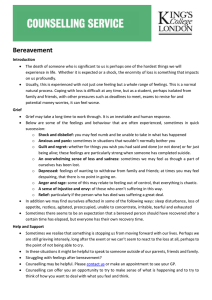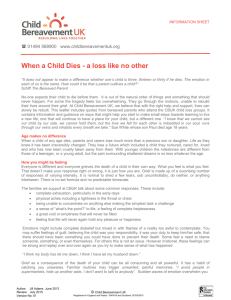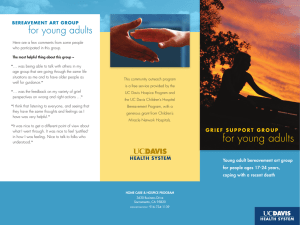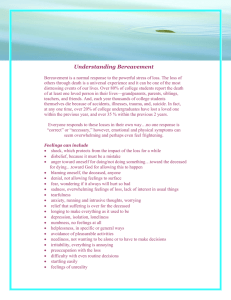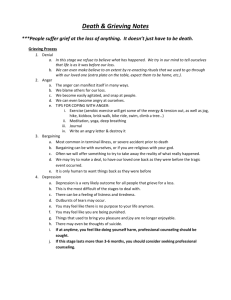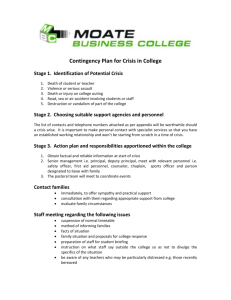Losing Your Partner Web 2
advertisement
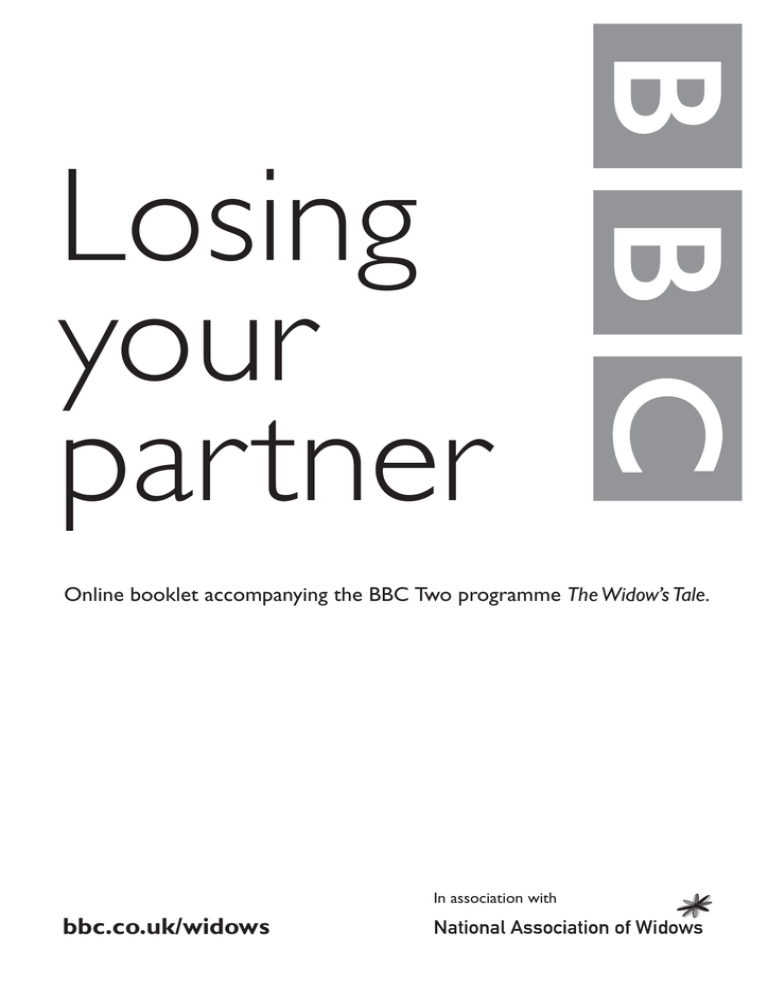
Losing your partner Online booklet accompanying the BBC Two programme The Widow’s Tale. In association with bbc.co.uk/widows Contents Introduction Page 3 1 Initial shock Page 4 2 Immediate practicalities Page 5 3 The emotional aftermath Page 9 4 Friends and family Page 11 5 Widowed with young children Page 13 6 As time passes Page 14 7 Rebuilding your life Page 15 8 Re-examing your life Page 16 9 Helping someone who has been bereaved Page 17 10 Useful contacts Page 18 2 Introduction This booklet is for anyone whose partner has died recently. It’s for men and women, young and old, whether you were married or with a long-term partner and whether it was a heterosexual or same-sex relationship. Its aim is to offer you emotional and practical support. you may be overwhelmed by your sense of pain and loss, and feel convinced it will never end. This booklet is to reassure you there’s a pattern to your grief and that, far from being alone in what you feel, your emotions are experienced by most of us as part of the grieving process. It also offers guidance on some of the many practical matters you have to deal with after the death of a partner, and touches on how friends and family can best support you at this difficult time. The death of the person you chose to spend your life with is probably the most devastating thing you’ll experience. That’s certainly how I felt six years ago – nothing else has come close. You may be bewildered and frightened by how bleak you feel and by the fact you can’t see any light at the end of the tunnel. At times Allow yourself to grieve – there’s no set time limit.You may never stop missing the person you loved, but you won’t always feel as wretched as you do now. Jean Sargeant Chair, National Association of Widows 3 Chapter 1 Initial shock When your partner dies, it can seem as if your whole world has come to an end. Their death may have been expected or you may be suffering the additional shock of a sudden bereavement. These situations are very different and each brings its own particular grief but, in either event, the likelihood is you’ll be overwhelmed with pain and disbelief. Another common reaction is to become emotionally numb.You may feel almost nothing, even though you’ve absorbed the facts of the situation.This isn’t a refusal to connect with reality – you know exactly what has happened – but a protective response that helps you to stay in control of your emotions while the truth sinks in. You may not even cry, although you know that, sooner or later, the floodgates will open. It has been described as a kind of detachment, like watching yourself on film. For some, this numbness serves as an anaesthetic that helps them deal with immediate practicalities and get through the funeral without breaking down. For others, it isn’t long before the numbness wears off and they have to deal with the full force of their grief. You may struggle to come to terms with the realisation you’re no longer part of a couple and your life will never be the same again. Any bereavement is painful, but losing the person you lived with is especially traumatic. So much of your life was shared – your home, friends, social life, holidays and, perhaps, When Mike was dying I children. Even people who acknowledge their partnership watched the movement in wasn’t a particularly happy one are the bag attached to his often surprised by the depth of oxygen mask getting smaller their grief. They may also feel sad and smaller and I knew when they’ve lost the chance to draw closer together. his last breath had been “ Few of us think about how we’d cope with losing the person we love; there seems little point in anticipating future unhappiness. Death also tends to be a conversational taboo, even between couples. So when it does happen, we’re often knocked sideways. It’s not uncommon for newly bereaved partners to see no future Everyone deals with bereavement taken. Yet my instant reaction for themselves and to think they’re in their own way. But if you was ‘I donÕt believe it ’. losing their minds. You may also or someone you know needs lose your appetite or become counselling or support, there are physically ill. It’s important to look organisations that can help. See after your health, so consult your GP if you feel unwell ‘Useful contacts’ for details. It can also be good to talk or are having difficulty sleeping. to your GP. ” Taking it in Special circumstances TV characters often react to the news that a loved one has died by saying: “It can’t be true. There must be some mistake.” This may seem unrealistic to people who’ve never been bereaved, but it’s a common response in real life too. For a while you may go on thinking or hoping it’s a bad dream and you’ll soon wake up. A bereavement can be especially difficult and distressing if your partner committed suicide or died as a result of a violent act, or was in prison.You may feel there’s a social stigma attached to these circumstances and experience feelings of anger or even shame that make it harder to turn to family and friends for support. For details of organisations that can help, see ‘Useful contacts’. 4 Chapter 2 Immediate practicalities There are many decisions and arrangements to be made in the first days after someone dies. death is clear, the doctor will give you a medical certificate and formal notice (as above), so you can make arrangements for the funeral. If the doctor wants to know more about the cause of death, a post-mortem (medical) examination will be carried out.This shouldn’t delay the funeral. For more information, see the Department for Work & Pensions (DWP) leaflet D49, What to Do After a Death in England and Wales, and D49S, What to Do After a Death in Scotland. Both are available from your local register office, social security office, Jobcentre or Jobcentre Plus, and from the DWP website, www.dwp.gov.uk. In Northern Ireland, leaflets GL14, Are You a Widow, Widower or Surviving Civil Partner?, and NP45, A Guide to Bereavement Benefits, are available from social security, jobs and benefits offices, or by calling 028 9054 9222. Death in hospital Reporting a death to the coroner In certain circumstances – if the cause of death is unknown or was the result of an accident or injury – the doctor may report it to the coroner. The coroner is a doctor or lawyer who looks into the cause of a death when more information is required before the death can be registered. My friends were marvellous They may arrange for a postfrom the very beginning. mortem (medical) examination. If They took me to the hospice this shows death was due to natural causes, the coroner will and then the funeral director. release the body for burial or I couldn’t have coped without cremation. “ them.They surrounded me love. If the death occurred in hospital, with the staff will contact the named next of kin.They will keep the body until you or another close relative arranges for it to be taken to a mortuary. The charity Victims’ Voice, www.victimsvoice.co.uk, produces a booklet, Sudden Death and the Coroner, listing contacts you can turn to for support and guidance. Death at home or elsewhere Organ donation ” It’s difficult to think about a subject such as organ donation when your partner has just died. But if your partner joined the organ donor register or requested their organs be used after death, it’s important to respect their wishes. You’ll be fully supported throughout the process. For more information, visit UK Transplant’s website, www.uktransplant.org. Expected death If your partner’s death was expected, the doctor who looked after them during their final illness will give you a medical certificate stating the cause of death. You’ll also be given a formal notice stating that the doctor has signed the medical certificate and telling you how to get the death registered. At this stage, you may want to contact your partner’s minister of religion, if appropriate, and a funeral director. Registering a death Unless your partner’s death has been referred to the coroner, it must be registered. In England and Wales, this must be done within five days at the register office for the district where the death occurred. Unexpected death If death was sudden or unexpected, you should contact your partner’s doctor and the police. If the cause of In Scotland, it should be done within eight days with the 5 Registrar of Births, Marriages and Deaths in any district. Crematoria are run by local authorities. Ashes can be scattered at a favourite place or in a garden of remembrance, buried in a churchyard or cemetery, or kept. In Northern Ireland, it should be registered within five days with the registrar in the district where the death occurred or where your partner normally lived. All relevant addressed are listed in the phone book. Burial Call before you go to check what documentation is required. Normally, you’ll need the medical certificate showing cause of death and your partner’s birth certificate, any marriage or civil partnership papers and their medical card, if possible. You’ll also need to provide your partner’s full name and address, place of birth, occupation, and date and place of death. Check your partner’s will and papers to find out if they’d reserved a space in a churchyard or cemetery. Most cemeteries are non-denominational, so you can have most types of service or ceremony. For advice on a religious burial, contact the relevant minister. Getting through the funeral In times of distress, most people turn to their families or closest friends. Besides giving you emotional comfort and support, there’s lots they can do to help, such as notifying people of the date and place of the funeral, and organising food and drink for afterwards. Arranging the funeral If your partner made a will, check for instructions about funeral arrangements. Some people organise their funeral in advance and/or contribute to a payment scheme. Don’t be afraid to lean on people at this time – that’s what close friends and family are for. But remember, too, that your partner’s relatives – children, parents, brothers and sisters – may also need support. If there’s to be a formal service, contact the appropriate person for the religion or belief concerned. You can design your own non-religious service. Decide whether you want flowers at the funeral or donations made to a named charity. One word of warning. Funerals are a time when families are thrown together whether they like it or not – and there’s potential for bad feeling. Some people have their own ‘agenda’ and may, intentionally or otherwise, say tactless or unhelpful things.You’ll be in a vulnerable state, so it’s important to ignore insensitive or thoughtless comments and not take them to heart. It’s possible to organise a funeral without the help of a funeral director. If you wish to do this, contact the cemeteries and crematorium department of your local authority for advice. Choosing a funeral director It’s also worth remembering that people with no experience of bereavement may be genuinely embarrassed by your intense grief and have no idea what to say. They may try to pretend nothing has happened or simply overdo the sympathy. Reactions like these are well meant, even if they seem inappropriate. Most people use the services of a professional funeral director. Costs vary widely, so ask friends, family, clergy or your doctor for a recommendation. If they are members of the National Association of Funeral Directors or the National Society of Allied & Independent Funeral Directors, they must provide a price list on request and not exceed their written estimate. Making arrangements for the funeral and coping with friends and family on the day itself can be so absorbing that the reality of your loss may not fully sink in until after the funeral is over. It’s better not to be on your own at this time, so if possible ask someone to keep you company. Funerals can be expensive. Check where the money to pay for it will come from before making any arrangements. If you are getting certain social security benefits, such as income support or pension credit, you may be able to claim a funeral payment to help with costs. For more information, see the Department for Work & Pensions leaflets D49 or D49S (for Scotland), or NP45 in Northern Ireland. Checklist It will help with practicalities to have the following information about your partner: • date and place of birth Cremation 6 • • • • • date of marriage or civil partnership, if applicable National Insurance number NHS number child benefit number, if applicable tax reference number. a bereavement payment. This is a one-off, tax-free sum based on your partner’s National Insurance contributions. A guide, Benefits and Bereavement, is available on the Citizens Advice Bureau website, www.adviceguide.org.uk. Go to the ‘Benefits’ section. In the first few days, you need to: • notify the family doctor • register the death at the local register office • contact a funeral director or begin funeral arrangements • advise the offices that were paying any benefits, tax credits or state pension. Bereavement allowance You may be entitled to bereavement allowance if you were 45 or over but below state pension age when your spouse or civil partner died.The amount depends on your age and your partner’s National Insurance contributions. If you’re 55 or over, you’ll get the full rate; if you’re under 55, you’ll get less. These weekly payments last for one year and stop if you reach retirement age before the end of that time. As soon as you can, notify your late partner’s: • friends • employer • bank, building society, post office or anywhere else your partner held an account • credit card and loan companies • local authority • HM Revenue and Customs. A guide, Benefits and Bereavement, is available on the Citizens Advice Bureau website, www.adviceguide.org.uk. Go to the ‘Benefits’ section. Widowed parent’s allowance You may be entitled to this if you’re under pensionable age and bringing up at least one child for whom you receive child benefit. The total amount will depend on your partner’s earnings and National Insurance record. The payments stop when the youngest child reaches 19 or leaves education. In time, you’ll need to cancel your partner’s subscriptions and club memberships, and return their passport and driving licence to the relevant offices. If you want to remove their name from databases and mailing lists, contact The Bereavement Register (see ‘Useful contacts’). A guide, Benefits and Bereavement, is available on the Citizens Advice Bureau website, www.adviceguide.org.uk. Go to the ‘Benefits’ section. Same-sex relationships The Civil Partnership Act, which became law in December 2005, gives same-sex civil partners the same rights as married couples. This includes recognition if your partner dies without leaving a will, inheritance of a tenancy agreement and access to fatal accident compensation. As legal next of kin, you’re exempt from inheritance tax on your partner’s estate. Dealing with the estate Before you can start dealing with your partner’s property, you need to find out if there’s a will. You may know where it is. If not, it may be among their personal papers or held by a bank or solicitor. If your partner named you as their executor, you’ll need to apply to your local probate registry for a grant of probate, which gives you the authority to administer the estate. To find your nearest registry, call 0845 302 0900 or go to www.hmcourts-service.gov.uk. The Lesbian and Gay Bereavement Helpline (see ‘Useful contacts’ for details) can offer support and practical information. Bereavement benefits for spouses and civil partners If everything has been left to you, this will be a relatively simple matter.There won’t be any inheritance tax to pay if you were married or in a civil partnership. The widow’s pension no longer exists for those widowed after April 2001, but you may be eligible for other benefits. Complications arise if your partner didn’t leave a will or name an executor. If there’s no will, you’ll need to decide who’s going to apply to sort out your partner’s affairs and contact your local probate registry to apply for letters of administration. An administrator may not Bereavement payment If you’re under state pension age, you may get 7 be necessary if the estate is small and your property and bank or building society accounts are held in joint names. An executor is responsible for carrying out the instructions in the will. It’s their duty to: • value the estate • collect all your partner’s assets • pay any inheritance tax • distribute the estate to the beneficiaries • pay for the funeral • pay any outstanding debts. Many people appoint a solicitor as executor or joint executor, especially if there are several beneficiaries. This costs more, but should help to avoid arguments. Many families fall out over wills. If one family member is responsible for administering an estate with more than one beneficiary, good communication, courtesy and absolute transparency are essential. For further information, call the Probate and Inheritance Tax helpline on 0845 302 0900 or go to www.hmcourts-service.gov.uk. 8 Chapter 3 The emotional aftermath Coping with grief can be a slow process. There are stages you may have to pass through. Organisations that can help are listed under ‘Useful contacts’. Anger With distress often comes anger. Some rail against God, some blame the doctor or hospital, and some direct their anger against the person who died (“If only he hadn’t smoked...” or “If only she hadn’t insisted on taking the car”). The anger may be especially intense if your partner was murdered, committed suicide or died as a result of someone else’s actions, such as dangerous driving. Longing When the reality of your loss sinks in, it’s natural to be overcome with longing for your partner. Common thoughts include: “If only I could turn back the clock,” and “If only I hadn’t said X,Y or Z...” Bereaved partners often ache for the physical presence of the other person. For a while, you may continue reaching out to that comforting presence on the other side of the bed, only to be reminded there’s no one there. There is no ‘right’ way to cope with this intense, often almost intolerable, grief. Some people are able to pour out their feelings to close friends and family (some of whom will, of course, be grieving too). Others prefer to keep a stiff upper lip in front of others, but sob, scream or hit the wall when they’re alone. Looking at old photos can be a comfort, but for many people this is simply too painful. Apathy This anger can last for a long time. It’s also likely to resurface at times when you miss your partner’s support – for example, if there’s a domestic crisis or you have to go into hospital. You may also feel angry with people who are happy. Shame “ Some people feel ashamed or embarrassed by being bereaved, I should have made her go much like some do after a divorce or separation. No one likes to be to the doctor much earlier. seen as an object of pity or as an All I could think about were emotional wreck who’s dependent my problems at work. on other people. This is especially hard for people who’ve always considered themselves as strong and who find it difficult to ask for help. Remember, no one expects you to be brave when you’ve just lost your partner. Don’t be afraid to ask for – and accept – help when you need it. In time, you’ll start to feel less vulnerable and more independent. ” It isn’t unusual to become apathetic after losing the person you loved. You may feel you can’t be bothered to wash or get dressed – all you want to do is pull the bedclothes over your head and hide. You may think nothing has much point any more. The very idea of enjoying yourself again is unthinkable. Fear The death of someone close is a frightening reminder of our own mortality. It can also give rise to other fears. You may be terrified by the force of your own grief and feel you’re almost drowning in it. You may also be afraid of the future and how you’ll cope on your own. These fears are normal and will pass in time. But if you’re overwhelmed by them, consider bereavement counselling or talk to others who’ve been through the same experience. Organisations that can help are listed under ‘Useful contacts’. This apathy is a form of depression and quite understandable, although you’re less likely to suffer from it if there’s a routine you must stick to, such as looking after children or going to work. 9 Guilt When a partner dies, we often wish we’d done more for them. Even if your relationship was happy, you can always think of things you ‘should’ have said or done. Some people blame themselves for their partner’s ill health or accident, imagining there was some way they could have prevented it.You may feel guilty about being the one who survived. If your partner suffered a long illness, you may hate yourself for feeling relieved that you can now get a good night’s sleep. There may also be guilt if your relationship wasn’t happy, or if you feel you put your career or children first. If the relationship was really difficult, you may feel you aren’t grieving enough. The important thing to remember is that these feelings are destructive. There’s no such thing as a perfect relationship.We all do the best we can within our own – and the other person’s – limitations. Sadness It may seem as if your feelings of unbearable grief and longing will last forever. But as time passes, you may start to notice these feelings no longer have the same grip over you, and that in their place comes a gentler sense of sadness and of loss. You may also realise you can, and do, enjoy yourself occasionally. When this happens, you’re coming to terms with your partner’s loss, although be prepared for setbacks when someone or something reminds you of how much you miss the person who shared your life. 10 Chapter 4 Friends and family In an ideal world, every bereaved person would have a sympathetic and understanding family to give them just the right amount of practical and emotional support. But families aren’t perfect and don’t always behave as we’d like. On a more positive note, many people find some family relationships become stronger after a bereavement. You may, for example, draw closer to a grandchild, child or sibling for whom you had less time when your partner was around. Close friends, especially those who knew your late partner, can be a great comfort at this time. They’ll understand how much you’ve lost and will be able to share your memories and empathise with your grief. It’s natural to worry about being a ‘nuisance’ in the early days, but talking openly and shedding a few tears are good therapy and close friends will probably be relieved there’s something they can do for you. Bear in mind, though, that best friends sometimes cope least well, while others can be unexpectedly supportive. At the funeral, you’ll probably be on autopilot. But when friends and wider family have gone, you’re likely to look to close family for continuing support. It’s important to remember that some of these relatives will be as shocked and grief stricken as you, so it may be a case comforting each other. It can be easy for a bereaved partner to forget this in the intensity of their own grief. If you have young children, they’ll need emotional support but will also benefit from being kept busy and sticking to a routine. There’s more about losing your partner when you have young children on page 13. “ A friend walked past me when I was talking to someone else and she just touched my arm as a sign of support. It was a very comforting gesture. However supportive your family, a time may come when they’ll expect you to have ‘got over’ your partner’s death and be getting on with your life. Possibly only people who’ve recently been widowed themselves realise you never stop appreciating the phone calls, visits and invitations. Not everyone has close friends on hand to offer support. They may live far away or have commitments that make it difficult for them to spend time with you. Some people don’t have a lot of friends, either because they’re self-sufficient or because they and their partner were so close they felt no need for them. Even if you do get wonderful support from friends, be prepared for this to slacken off over time. As with family, friends are likely to stop calling so often when they feel you’re over the worst, even if you feel your grief is still raw. ” It has been said it takes about two years to get over the initial grief of losing a partner, and about five to get back to what you feel is a more normal life again. Some bereaved people, on the other hand, find their families become quite smothering and intrusive, to the extent that all decisions are made for them and they’re never left alone to have a good cry. Bereavement can change the nature of a friendship.This is especially true of situations where you always socialised as a foursome. Whether a friendship lasts may depend on how much it relied on you being part of a couple. Many bereaved partners assume their loved one’s relations will continue to take the same interest as before – and often they do. But sometimes, if the relationship isn’t strong, they may retreat or even cut you off when they feel the link to ‘their’ side of the family has gone. Grown-up children, too, tend to be busy with their own lives, so may stop comforting you before you feel ready. Remember, too, that in some senses you’re a different person now. As time goes on, you’re likely to find new friends whose lifestyles fits better with yours. 11 The things people do or do not say can also cause problems. It’s natural to think no one understands how you feel, and you can become hypersensitive to other people’s comments and behaviour. Don’t take it to heart if someone you know crosses the road to avoid you.They may be in a hurry or don’t know what to say. Not everyone has the right words of sympathy on the tip of their tongue. The same principle applies to some of the clichés people come out with. You may find yourself on the receiving end of comments such as:“Never mind, you’re still young enough to meet someone else”,“I know how you feel because my dog died last week” or even “It’s not as bad as being left for someone else.” They’re crass and insensitive, but they’re meant well.The speakers are simply reflecting their own experiences when they should be relating a little better to yours. 12 Chapter 5 Widowed with young children Losing your partner when you’re young creates additional practical and emotional problems, especially if you have young children. It may seem as though you have to start your adult life again from scratch. Depending on your financial situation, you may need to find a better-paid job, go back to work or even move house. While it’s tempting to collapse and disappear under the covers, many bereaved parents find the routine of going to work and keeping life as normal as possible for the children keeps them going. have a wonderful ability to switch into ‘play’ mode when distracted, for example by friends or a trip to the park. It’s important to keep alive memories of your partner, with stories, photos and mementoes. Schools and nurseries are usually sensitive to this. Older children usually understand more about the permanence of death, but they may hide their feelings or react in other ways such as becoming withdrawn or losing interest in schoolwork. “ I was determined to carry on as normally as possible. I had to for my children. ” Child psychiatrists emphasise that grief in children is tied up with their sense of security. They need reassurance they’re still loved and wanted, and that you’re OK. Watch for signs that your child is being bullied at school – children can be notoriously insensitive about other’s grief. Some teenagers, when faced with a grieving parent, try to take on an adult role, but they still need a lot of support. The organisation Winston’s Wish provides support for bereaved children and young people up to the age of 18. WAY Foundation provides a self-help social and support network for widows and widowers up to the age of 50. For more details, see ‘Useful contacts’. Some children bottle up their grief and may become difficult or aggressive. Others need to keep talking about how they feel. However, most young children 13 Chapter 6 As time passes Once the fiercer emotions of shock and grief have subsided, you may be left with an acute sense of loneliness and longing for your partner. This stage of grief will probably last the longest. make arrangements with a friend or go on your own. You’ll get used to doing this. There may always be poignant or tearful moments – family celebrations, birthdays, anniversaries and so on – but you’ll get better at dealing with them. One area of your life where it isn’t so easy to be ‘brave’ is the loss of Your home may feel empty and intimacy. You’ll inevitably miss every time you have to undertake holding hands, physical and My younger son was married a task your partner used to do you emotional closeness, sharing a bed. may feel helpless and bereft. six weeks after her death. Many bereaved partners say what There’s no easy way round this I felt very alone. She had they miss most is having someone other than to accept any help to talk about ‘nothing’ with – wanted to live for that day. offered and perhaps think about commenting on TV programmes, acquiring some new skills laughing at the cat, discussing what – through an evening class, for to have for dinner. If you have example. young children you may also feel trapped at home Even harder, perhaps, is the challenge of getting used to during the evening and weekends. going places without your other half – restaurants, There’s no avoiding some loneliness after bereavement cinemas, holidays and parties. Instead of the two of you – it goes with the territory. But, eventually, you may find going out on the spur of the moment, you may have to living alone doesn’t necessarily mean being lonely. “ ” 14 Chapter 7 Rebuilding your life For a while after a bereavement, life can seem pointless. The things that mattered before don’t seem to be important any more. But the fact is, there’s no going back. You have to look to the future. Friends and family can help, but in the end you’re responsible for your life and only you can decide how to live it. You don’t have to make momentous changes. Most people find it helps to stick to a familiar routine. But if you find it too painful to go to places that remind you of your partner, don’t go. Change supermarkets, for example, or try a different restaurant. “ ready. When the time comes, do it with a close friend or relative if possible - it’s never an easy task. Don’t expect too much too quickly. Over time, the practicalities of life will claim more and more of your attention. Eventually, you’ll find yourself able to smile and laugh again, to recall happy memories without bursting into tears, even to enjoy yourself. Some people find it helpful be the person their partner my doctor said: would recognise – a brave, capable walls became human being. I did what when four unbearable, I put on my coat and went out, if only for a while. Work can be a lifesaver for those under retirement age. If you’re older, you may want to think about joining a club, starting a course or pursuing an interest that you didn’t have time for before. But remember, there’s no need to force yourself to do things that cause you pain. ” Your home is bound to be full of memories. You may not want to be confronted with these on an almost constant basis, but it isn’t always a good idea to move too soon. On the other hand, there’s no need to clear out your partner’s possessions until you’re completely To some extent, this change of outlook will happen automatically. But you also have to want it to happen. Remember, none of this means forgetting your partner. In fact, it’s important to keep talking about them. 15 Chapter 8 Re-examining your life Starting a new life is a challenge. It may help to ask yourself a few questions, such as: “What really matters to me?”, “Who really matters to me?” and “How do I enjoy spending my time?” The answers will enable you to test some of your basic priorities and assumptions. This is a chance to re-examine your life. You may decide you’re quite content with your lifestyle or that it’s time for change. Many people find they want to live more for the here and now. You have an opportunity to develop sides of yourself that were never developed before. Eventually, there’ll come a time when you feel ready to start socialising and making friends, perhaps with people who share your new interests. It may be too early to think about a new relationship, but this may be a very real possibility. Remember, this wouldn’t be a ‘betrayal’. No one can ever replace your partner, but you have the right to companionship and changed happiness. “ My values have entirely. I am on a spiritual journey. Losing someone you love changes your existence forever. But however sad and lost you feel, it’s important to remember that a time will come when you realise you’ve successfully rebuilt your life and are looking forward to the future. ” However happy your relationship was, you now have the freedom to do things you might never have done as a couple – from an Open University course to line-dancing or climbing Mount Kilimanjaro. 16 Chapter 9 Helping someone who has been bereaved You may feel you don’t know what to say to someone who has been bereaved. But it’s nearly always better to tell them how sorry you are than to do nothing or avoid the subject. It’s particularly important not to avoid mentioning the name of the person who has died. Things best avoided • Changing the subject when bereaved people talk about their loss. • Saying: “I know how you feel” unless you, too, have lost your partner. • Trying to soothe pain by saying: “It was a merciful release”, “Time heals” or “Try to think about some thing else.” Such remarks seldom help. • Giving advice without being asked for it. • Making promises of help you can’t keep. • Assuming the bereaved person will have, or should have, got over their loss by a certain time. Grieving nearly always takes longer than people expect. Other ways to help • Everyone grieves in their own way and at their own pace.Take your lead from the bereaved person and be guided by your understanding of them. It’s more helpful to take the initiative – to turn up for coffee or take round some food – than to say: “Let me know if you need anything.” The bereaved person may be reluctant to take up a vague offer. • A letter can let the bereaved person know in a few words that you’re sad about their loss and are thinking of them. If you knew the person who died, you could share a memory of them. It’s thoughtful to add: “There’s no need to answer this letter.” • It helps to talk to someone who’s prepared to listen – expressing feelings can ease distress. Don’t be embarrassed or feel guilty if your sympathy triggers tears or you find yourself crying too. • Bereaved people are usually grateful for practical help, but ask first. Ways of helping might include shopping, cooking, child-minding, picking up children from school, gardening, giving lifts in your car, mending things or sorting out correspondence. • Continue to be supportive - the effects of losing someone are felt for years. Stay in regular contact if you can and try to remember birthdays and anniversaries. 17 Chapter 10 Useful contacts A variety of self-help groups and support networks exist to help people who’ve lost their partner. National Association of Widows Support from people who know how they feel. Membership is open to women of all ages, and men can also join some activities. Emotional support to those bereaved through murder or manslaughter. Tel: 0845 838 2261 Email: nawidows@bbc.co.uk Website: www.nawidows.org.uk Support & Care after Road Death & Injury (SCARD) Works to helps relieve distress among people who’ve been bereaved, injured or affected by road death or injury. Access to free practical and legal help, and counselling. Website: www.samm.org.uk WAY Foundation Self-help, social and support network for men and women under 50 who have been widowed. Tel: 0845 123 5542 Website: www.scard.org.uk Tel: 0870 011 3450 Email: wayfoundation@bbc.co.uk Website: www.wayfoundation.org.uk Survivors of Bereavement by Suicide (SOBS) Aims to meet the needs and break the isolation of those bereaved by suicide. Cruse Bereavement Care Bereavement counselling and support by trained volunteers, on the phone, in your home or through local groups. Also provides information on practical issues. Tel: 0870 241 3337 Website: www.sobs.admin.care4free.net Lesbian and Gay Bereavement Helpline Helpline offering support and practical information for lesbian, gay, bisexual and transgender people by London Friend. Has a large database of charities throughout the UK. Tel: 0844 477 9400 Email: cruse@bbc.co.uk Website: www.cruse.org.uk Samaritans Confidential emotional support available 24 hours a day, seven days a week. Tel: 020 7403 5969 (Tuesdays, 7.30pm to 10pm) Website: www.londonfriend.org.uk Tel: 08457 90 90 90 (local call cost) Email: jo@samaritans.org.uk Website: www.samaritans.org.uk Stonewall Provides legal information for lesbians, gay men and bisexuals. National Bereavement Partnership National helpline for bereaved people. Tel: 020 7593 1850 Website: www.stonewall.org.uk Tel: 0845 226 7227 Website: www.natbp.org.uk Winston’s Wish Practical support and guidance for bereaved children and young people, and their families. Merrywidow.me.uk Online support and message boards based around one woman’s account of being widowed young. Tel: 0845 203 0405 Website: www.winstonswish.org.uk Website: www.merrywidow.me.uk Support After Murder & Manslaughter (SAMM) Victims’ Voice 18 Help for people who have been victims of criminal acts. Tel: 079 8407 8918 Email: victimsvoice@hotmail.com Website: www.victimsvoice.co.uk Practical information following a death BBC Relationships Go to the ‘Bereavement’ section for an in-depth look at many of the topics mentioned in this booklet. Website: www.bbc.co.uk/relationships Directgov Go to the ‘Death and bereavement’ section for information on practical issues including making a will, what to do immediately after a death, benefits, money and property. Website: www.direct.gov.uk/en/rightsandresponsibilities Jobcentre Plus Financial and benefit information. Go to ‘Want to make a claim?’ on the website, or visit your local benefits agency, post office or Jobcentre Plus. Website: www.jobcentreplus.gov.uk The Bereavement Register Register to stop direct mail being sent to the deceased. Tel: 0870 600 7222 Website: www.thebereavementregister.org.uk INQUEST Information and help on the inquest process. Website: www.inquest.org.uk Probate and Inheritance Tax helpline Information about wills and inheritance. Tel: 0845 302 0900 19 Acknowledgements Grateful thanks to Jean Sargeant, chair of the National Association of Widows, and the NAW members whose personal experiences are reflected in the ideas and quotations throughout this booklet. Thanks also to the WAY Foundation, Cruse Bereavement Care and Stonewall for their advice and guidance. Published by BBC Learning, Room 2531,White City, 201 Wood Lane, London W12 7TS. To obtain permission to photocopy or reproduce any part of this booklet, please write to the address above. Design: A3 Design © BBC / National Association of Widows 2007
